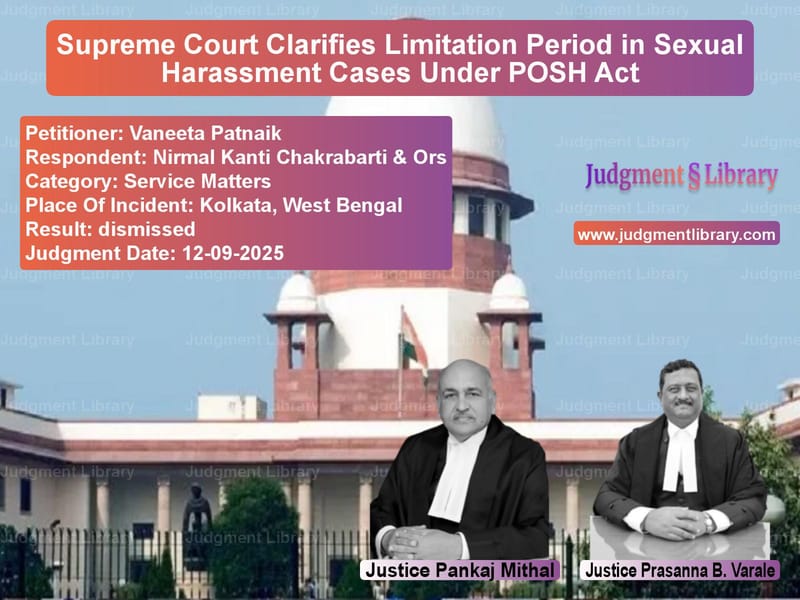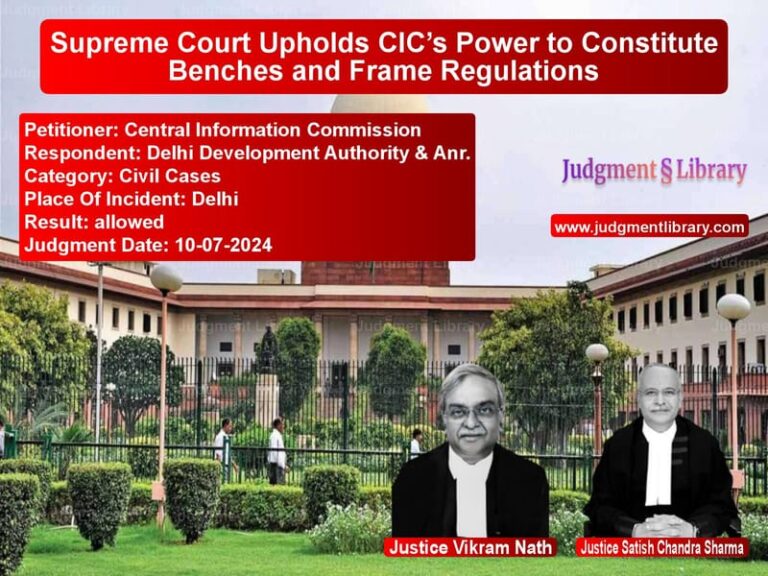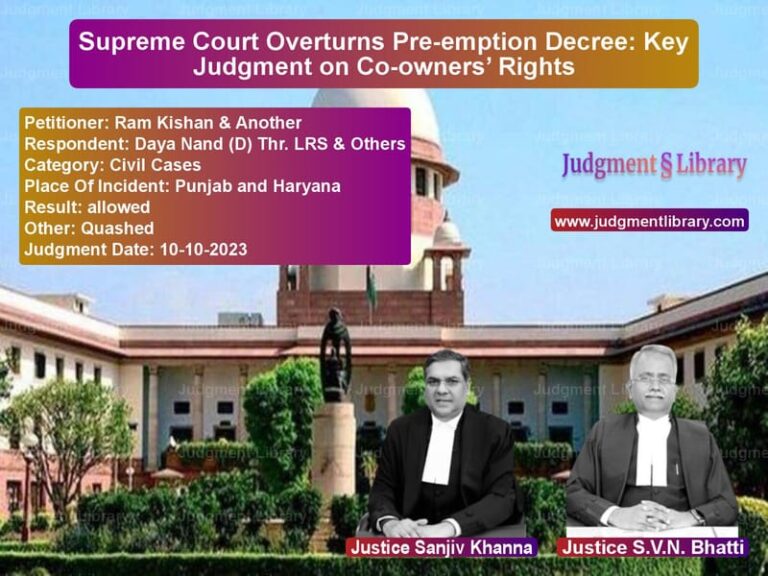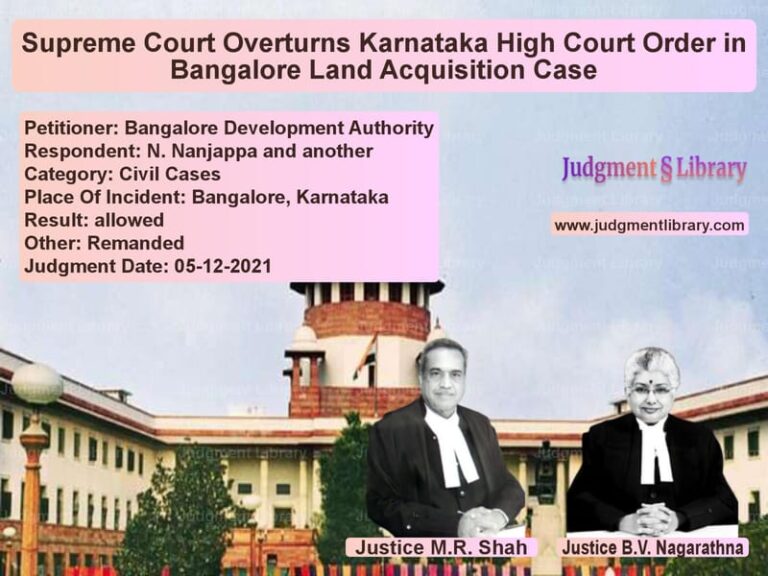Supreme Court Clarifies Limitation Period in Sexual Harassment Cases Under POSH Act
In a landmark judgment that brings clarity to the interpretation of limitation periods in sexual harassment cases, the Supreme Court of India recently delivered a verdict that has significant implications for workplace harassment complaints across the country. The case involved a faculty member of the West Bengal National University of Juridical Sciences (NUJS) who had filed a sexual harassment complaint against the Vice-Chancellor, only to see it rejected as time-barred, leading to a legal battle that reached the highest court of the land.
The appellant, Ms. Vaneeta Patnaik, a faculty member at NUJS, had lodged a formal complaint with the Local Complaint Committee (LCC) on December 26, 2023, alleging sexual harassment by Dr. Nirmal Kanti Chakrabarti, the Vice-Chancellor of the university. The LCC rejected her complaint as barred by time since the last alleged incident of sexual harassment had occurred in April 2023, which meant the complaint was filed beyond the prescribed limitation period of three months and even beyond the extendable period of three months, making it six months from the date of the last incident.
The Legal Journey Through Courts
Aggrieved by the rejection of her complaint, the appellant approached the High Court. The single Judge of the High Court quashed the order of the LCC and directed rehearing of the complaint on its merits. The single Judge held that “the appellant was subjected to threat of detrimental treatment in her employment even after April 2023 and as the Vice-Chancellor created an intimidating, offensive and hostile work environment for her, as such the complaint was within time, taking the subsequent event as the last incident of sexual harassment.”
However, this decision was challenged before the Division Bench, which allowed the appeal and restored the LCC’s decision to reject the complaint as time-barred. The Division Bench held that “administrative actions taken against the appellant after April 2023 were collective decisions of the Executive Council, consisting of eminent academicians, jurists and even Supreme Court Judges and were not just personal actions of the Vice-Chancellor.” The Bench further observed that “It was improbable for the Vice-Chancellor to have prevailed over the decision of the Executive Council, exerting his pressure. He was not in a position to manipulate the decision of the Executive Council.”
Understanding Sexual Harassment Under POSH Act
The Supreme Court bench comprising Justices Pankaj Mithal and Prasanna B. Varale began its analysis by examining the definition of sexual harassment under the Sexual Harassment of Women at Workplace (Prevention, Prohibition and Redressal) Act, 2013 (POSH Act). The Court noted that “‘Sexual harassment’ is defined in Section 2(n) of the POSH Act to include any one or more of the unwelcome act or behaviour (whether directly or by implication) such as physical contact and advances; or a demand or request for sexual favours; or making sexually coloured remarks; or showing pornography; or any other unwelcome physical, verbal or non-verbal conduct of sexual nature.”
The Court further elaborated on Section 3 of the POSH Act, which describes circumstances that would amount to sexual harassment, including “implied or explicit promise of preferential treatment in her employment; or implied or explicit threat of detrimental treatment in her employment; or implied or explicit threat about her present or future employment status; or interference with her work or creating an intimidating or offensive or hostile work environment for her; or humiliating treatment likely to affect her health or safety.”
The Crucial Issue of Limitation
The Court examined Section 9 of the POSH Act, which mandates that “any aggrieved woman may make a complaint, in writing, of sexual harassment at the work place to the Local Committee within a period of three months from the date of incident, and in the case of series of incidents, within a period of three months from the date of the last incident.” The second proviso allows the LCC to extend this period by another three months for reasons to be recorded in writing, making the maximum permissible period six months from the last incident.
The Court made an important observation about handling limitation issues: “No doubt, the issue of limitation is ordinarily a mixed question of fact and law and it may not be possible to throw out a complaint at the threshold without collecting material on the factual aspects relating to the limitation. Nonetheless, where a complaint on the simple reading of the averments made therein appears to be patently barred by limitation, it can be rejected at the very first instance on the analogy of Order VII Rule 11 CPC, without even calling the other side to participate in the proceedings.”
Analyzing the Facts of the Case
The Court meticulously examined the allegations in the complaint, which revealed that the sexual harassment allegedly began in September 2019 when the Vice-Chancellor called the appellant to his office and “insisted that she should accompany him for dinner, which would greatly benefit her personally. He even touched her hand in a manner that made her extremely uncomfortable.” In October 2019, “He asked her whether she has thought over his proposal for going out for a dinner. The appellant told him that she is not comfortable and wants to keep the relationship professional only. He, thereafter, demanded sexual favour from her and threatened her if the offers are declined.”
The last incident of alleged sexual harassment occurred in April 2023 when “he asked the appellant to accompany him on a trip to a resort which the appellant flatly refused. Thereupon, he threatened the appellant that her career would suffer badly.” Subsequently, in August 2023, the appellant was removed as Director of Centre of Financial, Regulatory and Governance Studies, and an inquiry was initiated against her regarding utilization of project funds.
Continuing Wrong vs Recurring Wrong
The Court made a crucial distinction that became central to its decision: “A distinction has to be made between a ‘continuing wrong’ and a ‘recurring wrong’. The difference between the two has been clarified in Union of India vs. Tarsem Singh where it has been held that a ‘continuing wrong’ is when the injury itself persists, whereas a ‘recurring wrong’ is when a fresh cause of action arises each time.”
The Court observed that “The alleged act of harassment of April 2023, was a complete act in itself and had not continued thereafter. The administrative measures of August 2023, were independent and were collective decisions of the NFCG and the Executive Council which cannot be solely attributed to the Vice-Chancellor.”
The Court’s Final Analysis and Ruling
After thorough examination, the Court concluded that “The actions taken against the appellant in August 2023, are administrative in nature and does not create a gender based hostile environment, and hence, fall short of being actions amounting to acts of sexual harassment.”
The Court emphasized that “It would be important to refer to the expressions ‘in relation to’ or ‘connected with’ used in Section 3(2) of the Act. The use of the above expression clearly demonstrates that there has to be a direct link between the action complained of and an overt act of sexual harassment. In view of what has been said above, we find no such direct link between the last incident of sexual harassment which happened in April 2023, and those referred to subsequently in August 2023 or December 2023.”
The Court also noted an important factor: “The appellant, in addressing her grievances to the Chancellor, had not made any mention whatsoever of the sexual harassment which may have taken place in August, 2023 onwards. The appellant initiated the complaint on 26.12.2023, immediately after the Executive Council meeting on 21.12.2023, which had resolved to inquire into diverse acts of misconduct on part of the appellant, that could give an impression that the complaint was filed in retaliation.”
A Unique Directive for Future Accountability
While dismissing the appeal on technical grounds of limitation, the Court made a significant observation that balances technical justice with substantive accountability: “It is advisable to forgive the wrongdoer, but not to forget the wrongdoing. The wrong which has been committed against the appellant may not be investigated on technical grounds, but it must not be forgotten.”
In a remarkable move ensuring that the allegations don’t simply disappear due to technicalities, the Court directed that “this judgment shall be made part of the resume of respondent no.1, compliance of which shall be strictly ensured by him personally.” This directive ensures that the allegations and the Court’s findings remain part of the official record associated with the respondent.
The Supreme Court’s judgment brings much-needed clarity to the interpretation of limitation periods in sexual harassment cases while emphasizing the importance of timely filing of complaints. At the same time, the Court’s innovative approach to ensuring accountability through the resume directive sets a significant precedent for handling cases where technical limitations might otherwise allow serious allegations to be buried without proper examination of their merits.
Petitioner Name: Vaneeta Patnaik.Respondent Name: Nirmal Kanti Chakrabarti & Ors.Judgment By: Justice Pankaj Mithal, Justice Prasanna B. Varale.Place Of Incident: Kolkata, West Bengal.Judgment Date: 12-09-2025.Result: dismissed.
Don’t miss out on the full details! Download the complete judgment in PDF format below and gain valuable insights instantly!
Download Judgment: vaneeta-patnaik-vs-nirmal-kanti-chakrab-supreme-court-of-india-judgment-dated-12-09-2025.pdf
Directly Download Judgment: Directly download this Judgment
See all petitions in Workplace Harassment
See all petitions in Employment Disputes
See all petitions in Disciplinary Proceedings
See all petitions in Public Sector Employees
See all petitions in Judgment by Pankaj Mithal
See all petitions in Judgment by Prasanna Bhalachandra Varale
See all petitions in dismissed
See all petitions in supreme court of India judgments September 2025
See all petitions in 2025 judgments
See all posts in Service Matters Category
See all allowed petitions in Service Matters Category
See all Dismissed petitions in Service Matters Category
See all partially allowed petitions in Service Matters Category







